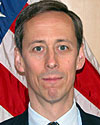Doing Business In South Africa

ALLEN
When Transportation Management Services, Sandy Spring, Md., was looking to do business in South Africa, company officials contacted the U.S. Embassy’s Commercial Service office in Johannesburg. We introduced the company to key South African transportation officials, who, in January 2007, were traveling tothe U.S. We then provided the company with customized support from overseas commercial officers and specialists.
In the end, TMS signed a memorandum to provide $156,000 worth of services to a provincial government and then later agreed to $15 million in World Cup contracts.
Sixteen years after holding its first general elections with universal adult suffrage, South Africa continues to raise its international profile as a market destination for businesses and investment. South Africa is an important door into the African market for U.S. companies for several reasons.
First, South Africa is the most advanced, broad-based and productive economy in Africa, with a 2009 estimated gross domestic product of $277.4 billion as well as positive long-term growth rates.
Among its advantages, South Africa has a long-established commitment to the rule of law and a position as a key transportation and logistics hub. Further, the country has competitively priced business services, a sophisticated banking sector and an appetite for branded U.S goods.
A great deal of planned infrastructure work in South Africa will create many opportunities spanning many industry sectors: energy, telecommunications, airport development and road construction, among others.
For example, government-owned utilities such as Eskom (electric power) and Transnet (transportation) have formalized capital five-year expenditure plans for more than $50 billion. The World Bank and the African-American Development Bank (www.export.gov/africa/eg_main_016853.asp) also have many opportunities.
However, companies doing business in South Africa face several challenges.
The country’s Central Bank has kept inflation in check, but as an unintended consequence there has been substantial volatility in the exchange rate with the dollar. The dollar-rand relationship reached a low of 14 to one in 2005 and a high of six to one in 2008. Exporters need to be prepared for the potential volatility of the exchange rate.
Technical skills are in high demand, and wages for staff with technical skills are relatively high. Further, unions are strong, and the labor laws in South Africa are relatively inflexible, which can increase the cost of projects.
The public-sector tendering process, particularly at the municipal and provincial levels, can often be chaotic and unpredictable; this state of affairs is particularly true at the provincial and local levels. Tenders sometimes are cancelled before the contract is finalized. Also, politically connected firms seem to have an unfair advantage over foreign bidders, according to some observers.
Organized crime is common, although most U.S. firms working in the country have not encountered corruption. According to Transparency International’s 2009 Corruption Perception Index, the nation rated a 4.7 out of 10— a level roughly comparable to Poland or Malaysia—in the perceived level of public-sector corruption. (A higher score would mean less perceived corruption.)
Street crime and gangs are a more important worry when doing business in many cities in South Africa. Depending on the specific business model and location, many businesses must arrange for complex and costly security arrangements for their staff and facilities. Companies may need both capital equipment and special staff to guard property and protect workers.
While South Africa has a robust democratic structure, a significant majority of the population consistently has voted for the ruling party, the African National Congress (ANC), in the past 16 years. Despite operating within a system dominated by one party, the South African judiciary is virile and fiercely independent. The South African media is yet more stridently independent and can be harshly critical of the government and the ANC. Thus, the democratic insti-tutions in South Africa do not pose a risk to foreign business. The U.S. Embassy’s Commercial Service office can help your company get started doing business here.



